| Srl | Item |
| 1 |
ID:
162628
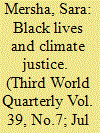

|
|
|
|
|
| Summary/Abstract |
This article shares examples of the leadership of Black communities and social movements in the struggle for climate justice, in four different parts of the world: resisting extraction and promoting community health in Nigeria; addressing extreme climate impacts and building people’s sovereignty in Haiti; confronting repression, defending territory and Mother Earth in Honduras; and cultivating community control and building a land-based movement in the US. Together, these examples have rich lessons to share around the importance of linking climate justice with racial justice; of combining strategies of resistance with those of creating alternative models; of maintaining focus on Black communities’ connections with land, territory and Mother Earth; of recognising and creating space for women’s leadership; and of intersectionality across geography and sector.
|
|
|
|
|
|
|
|
|
|
|
|
|
|
|
|
| 2 |
ID:
144264
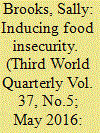

|
|
|
|
|
| Summary/Abstract |
The G7 ‘New Alliance for Food Security and Nutrition’ follows an established approach of ‘connecting smallholder farmers to markets’, while extending the role and influence of corporate agri-business in new ways. This paper explores the implications of the ‘New Alliance’ model’s incorporation into the Sustainable Development Goals framework for smallholder producers already facing greater uncertainty in financialised agri-food chains, and in light of a consensus around the primacy of private finance in the post-2015 era. The question for alternative food and development movements is how to confront the ‘value chain challenge’ in an increasingly financialised global agri-food system.
|
|
|
|
|
|
|
|
|
|
|
|
|
|
|
|
| 3 |
ID:
157709
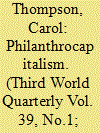

|
|
|
|
|
| Summary/Abstract |
Engaging the lively debates about the next expression of neoliberalism, this study suggests that it is evolving into philanthrocapitalism. After a brief discussion of the trajectories from neoliberalism, the article addresses the core ideology of philanthrocapitalism. The central thesis explores how philanthrocapitalism is moving beyond the requirement of ‘business practices’ for recipients of donor funds, into enforcing ‘business rule’ on to the public domain. Although philanthrocapitalism is most debated in the fields of health care and education, this article uses empirical analysis of international agricultural policies trying to enlist Southern Africa policies. It explores how philanthrocapitalist rule is reducing transparency, participation and deliberation within the public domain, well beyond requesting efficient business practices for greater food security. It concludes with how smallholder farmers are actively organising to resist business rule over their genetic resources and farming practices.
|
|
|
|
|
|
|
|
|
|
|
|
|
|
|
|
| 4 |
ID:
151487
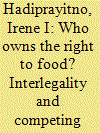

|
|
|
|
|
| Summary/Abstract |
Economic globalisation has transformed the politics of realising the right to food. This article aims to discuss the extent to which competing as well as conjoined interests in agricultural modernisation reconfigure the right to food as actors, norms and practices change. Drawing upon the concept of interlegality, which considers dynamic perspectives of plural legal orders, the discussion focuses on, first, existing norms linked to the wider understanding of the right to food and, second, the interplay of interests supported by the state, corporations and civil society organisations. The Indonesian agricultural modernisation project in Papua is used as a case study.
|
|
|
|
|
|
|
|
|
|
|
|
|
|
|
|
| 5 |
ID:
154793
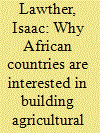

|
|
|
|
|
| Summary/Abstract |
Ten years ago, China and several African countries began to develop agricultural training centres, and opened the door for a cascade of optimism and pessimism on why China is interested in developing agricultural partnerships in Africa. Seldom has the appeal of such partnerships for African countries been explored, hence limiting our capacity to fully understand the dynamics of Sino–African agricultural relations. This article addresses the issue by examining why some African countries are interested in partnering with China in agricultural development. This article is based on 44 interviews that were conducted in 2015 at the Sino–African agricultural training centres in Rwanda and Uganda. I argue that Rwanda and Uganda seek to partner with China, as China can offer intermediary agricultural technologies that enable these respective countries to implement aspects of their domestic agricultural development plans. The article also provides reason to challenge the existing optimistic and pessimistic conventions about Sino–African agricultural affairs.
|
|
|
|
|
|
|
|
|
|
|
|
|
|
|
|